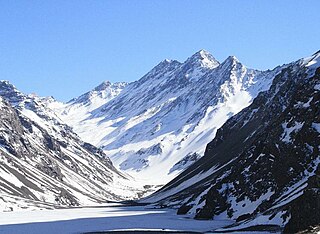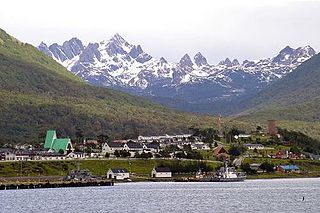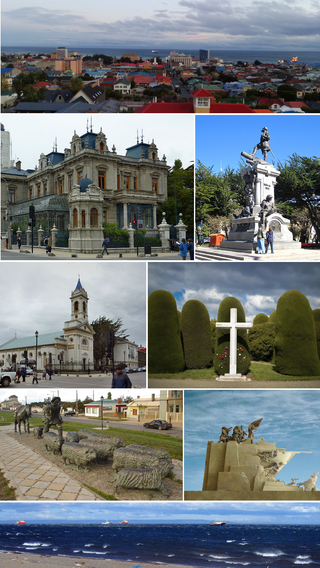
Valparaíso is a major city, seaport, naval base, and educational centre in the commune of Valparaíso, Chile. "Greater Valparaíso" is the second largest metropolitan area in the country. Valparaíso is located about 120 km (75 mi) northwest of Santiago by road and is one of the Pacific Ocean's most important seaports. Valparaíso is the capital of Chile's second most populated administrative region and has been the headquarters for the Chilean Navy since 1817 and the seat of the Chilean National Congress since 1990.

The Valparaíso Region is one of Chile's 16 first order administrative divisions. With the country's second-highest population of 1,790,219 as of 2017, and fourth-smallest area of 16,396.1 km2 (6,331 sq mi), the region is Chile's second most densely populated after the Santiago Metropolitan Region to the southeast. The region also includes the remote Easter Island in the Pacific Ocean.

Thomas Cochrane, 10th Earl of Dundonald, Marquess of Maranhão, styled Lord Cochrane between 1778 and 1831, was a British naval flag officer of the Royal Navy, mercenary and Radical politician. He was a successful captain of the Napoleonic Wars, leading Napoleon to nickname him le Loup des Mers, 'the Sea Wolf'. He was successful in virtually all of his naval actions.

The Magallanes Region, officially the Magallanes y la Antártica Chilena Region, is one of Chile's 16 first order administrative divisions. It is the southernmost, largest, and second least populated region of Chile. It comprises four provinces: Última Esperanza, Magallanes, Tierra del Fuego, and Antártica Chilena.

Earl of Dundonald is a title in the Peerage of Scotland. It was created in 1669 for the Scottish soldier and politician William Cochrane, 1st Lord Cochrane of Dundonald, along with the subsidiary title of Lord Cochrane of Paisley and Ochiltree, with remainder to his heirs male, failing which to his heirs female without division who should bear or assume the name of Cochrane, and in failure thereof to his heirs general. In 1647, he had already been created Lord Cochrane of Dundonald in the Peerage of Scotland, with remainder to the heirs male of his body.
Cochrane is a surname with multiple independent origins, two Scottish and one Irish. One of the Scottish names derives from a place in Scotland; the Irish surname and the other Scottish surname are both anglicisations of surnames from the Irish language and Scottish Gaelic respectively.

Puerto Williams is the city, port and naval base on Navarino Island in Chile. It faces the Beagle Channel. It is the capital of the Chilean Antarctic Province, one of four provinces in the Magellan and Chilean Antarctica Region, and administers the communes of Chilean Antarctic Territory and Cabo de Hornos. It has a population of 2,874, including both naval personnel and civilians. Puerto Williams claims the title of world's southernmost city. The settlement was founded in 1953, and was first named Puerto Luisa. The town was later named after John Williams Wilson, a British man who founded Fuerte Bulnes, the first settlement in the Strait of Magellan. It has served primarily as a naval base for Chile. The Chilean Navy runs the Guardiamarina Zañartu Airport and hospital, as well as nearby meteorological stations. Since the late 20th century, the number of navy personnel has decreased in Puerto Williams and the civilian population has increased. In that period, tourism and support of scientific research have contributed to an increase in economic activity.

Archibald Cochrane, 9th Earl of Dundonald FRSE was a Scottish nobleman and inventor.
The Scottish diaspora consists of Scottish people who emigrated from Scotland and their descendants. The diaspora is concentrated in countries such as the United States, Canada, Australia, England, New Zealand, Ireland and to a lesser extent Argentina, Chile and Brazil.

Clan Cochrane is a Scottish clan of the Scottish Lowlands.

Historically, Scotland has a long military tradition that predates the Act of Union with England. Its soldiers form part of the armed forces of the United Kingdom, more usually referred to domestically within Britain as the British Armed Forces.

Punta Arenas is the capital city of Chile's southernmost region, Magallanes and Antarctica Chilena. The city was officially renamed as Magallanes in 1927, but in 1938 it was changed back to "Punta Arenas". It is the largest city south of the 46th parallel south, and at the same time the most populous southernmost city in Chile and in the Americas, and due to its location, the coldest coastal city with more than 100,000 inhabitants in Latin America. It is one of the most southerly ports in the world, serving as an Antarctic gateway city.

The Cochrane River is a short river of Chile located in the Aysén del General Carlos Ibáñez del Campo Region. It is the outlet of Cochrane Lake and empties into the Baker River. The town of Cochrane is situated along the river.
British Chileans are Chilean residents with fully or partial antecedents from the British Isles. The British have been very important in the formation of the Chilean nation. They include Chileans of English, Scottish, Ulster Scots, Irish and Welsh ancestry. The numbers of Scottish and Welsh are higher in Patagonia, in Aysén and Magallanes regions. The highest percentage of British Chileans is found in Punta Arenas, followed by Santiago, Valparaíso, Concepcion, Viña del Mar and Antofagasta.

Spanish Chileans refer more often to Chileans of post-independence Spanish immigrant descent, as they have retained a Spanish cultural identity. People of pre-independence Spanish descent are usually not considered Spanish Chileans even though they form a large majority of the Chilean population and have Spanish surnames and ancestry. This is because they rejected Spanish identity for the emergent Chilean one on the eve of national independence.
Irish Chileans are the inhabitants of Chile who either came from some part of the island of Ireland or are descendants of immigrants from there. Generally coming in the 18th century and early 19th century, the generally Catholic Irish were seeking refuge from the oppression of the Protestant-run government of the Kingdom of Great Britain. Spain, being a Catholic power, enticed many Irish to move to Latin America. Immigration diminished later in the 19th century as Catholic Emancipation made emigration to a Catholic nation less of a vital consideration and as the United States and Canada established themselves as more viable lands for settlement.
Thomas Cochrane, 8th Earl of Dundonald was a Scottish nobleman, army officer and politician. He was Member of Parliament for Renfrewshire, 1722–1727. He served as Commissioner of the Excise for Scotland from 1730 until 1764. He acceded to the title of Earl of Dundonald in 1758 on the death of his cousin, William Cochrane, 7th Earl of Dundonald.
Thomas Barnes Cochrane, 11th Earl of Dundonald was a Scottish nobleman. He was son of the radical politician and sailor Thomas Cochrane, 10th Earl of Dundonald. As a child he accompanied his father to Chile as a stowaway on the Chilean frigate O'Higgins (1816). In February 1819 the O'Higgins attempted to raid the city of Callao, but was repelled by the coastal fortresses. Thomas Cochrane 11th was almost hit by a cannonball, which instead killed a sailor next to him.

Thomas Hesketh Douglas Blair Cochrane, 13th Earl of Dundonald was an officer in the British Army who served in World War I. He was a representative peer for Scotland and chairman of the Anglo-Chilean Society.
Thomas Cochrane, 6th Earl of Dundonald was a Scottish aristocrat.












